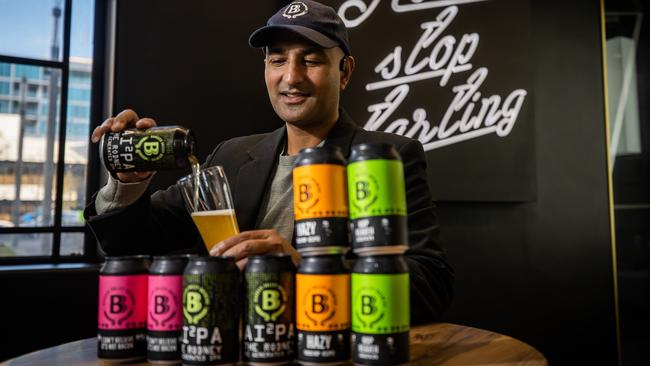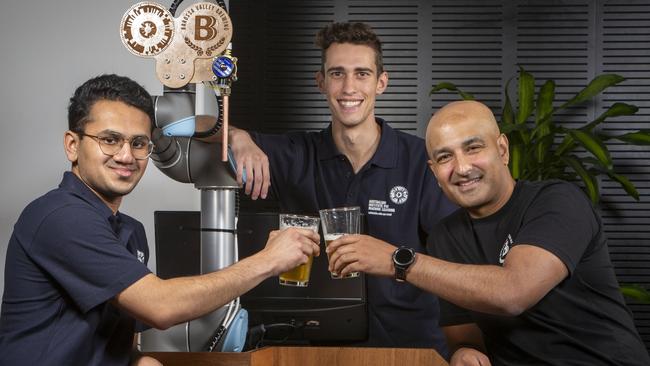First beer made with artificial intelligence created at Adelaide’s Lot Fourteen – and it’s got a kick
The first Aussie beer made using artificial intelligence has been brewed at Lot Fourteen. And we’ve tried it.
SA Weekend
Don't miss out on the headlines from SA Weekend. Followed categories will be added to My News.
What do you get when you cross a few hundred thousand recipes, an advanced neural network, a bunch of computer scientists and a handful of beer lovers?
It sounds like the start of a really bad joke but, in truth, these are the basic ingredients that spawned the first known Australian beer created by artificial intelligence (AI).
Barossa Valley Brewing founder Denham D’Silva, a former investment banker, says the seed was planted when his brewery started supplying drinks for some of the businesses at Lot Fourteen. Connections were made. Friendships formed.
MORE: SA’s 22 hottest start-ups
“I managed to meet some really interesting people there,” he says.
One of those was Professor Anton van den Hengel, who was then the director at the Australian Institute for Machine Learning.
“Now he is a big beer fan, as is the current director Simon Lucey,” D’Silva says.
“And I was an AI geek. I was very much just an enthusiast and was well aware that things like algorithms were controlling and influencing us much more than we understood and would have an increasingly powerful influence on everyday life.

“And that was what they did professionally. It was all inverse. Their interest was in beer. AI was their profession. My interest was in AI … it’s pretty funny when you think about it.”
Then the serious talk started: How could they use AI to create a brand new beer?
“So basically, we created a neural network,” he says.
“AI basically needed to understand what was important to a beer; there’s thousands of potential variables in creating a beer.
“And we talked to the computer scientists to build this neural network to understand what was important.
“It learned from accessing about 400,000 recipes. We narrowed it down to IPAs, which is why it is rather strong.”
He’s not kidding. It is a strong, deeply flavoured IPA, with a kick in the tail.
The version we are trying is called The Rodney. It’s 5.5 per cent alcohol and 1.8 standard drinks. (It’s named after Rodney Brooks, an Adelaide-born professor at MIT’s Artificial Intelligence Laboratory).
D’Silva says quite apart from proving the technology works, they wanted to ensure the beer felt neither bland nor artificial.
“One of the things I was quite optimistic about was that craft beer is so much about passion and so much about the skill set of a brewer,” he says.
“And if we hand this over and all it creates is a bland but popular beer. You know, easy drinking.
“It’s not that at all. Everyone says this tastes and smells and feels like one of Barossa Valley Brewing beers because our beers are very much influenced by the winemakers in the Barossa – those big shirazes.”
The reason? The AI “learned” from the brewers at Barossa Valley Brewing.
“We were able to impart our values for what made a beer into the network. We then narrowed down the recipes generated and picked the one we thought was the best one,” he says.
“I like to say we put the art in artificial intelligence.
“So it’s really this wonderful collaboration between, you know, sort of this ancient brewing culture and the latest AI technology.”
Beyond the knockout taste – the beer won several awards at the International Beer Awards in Melbourne – D’Silva now wants to use the technology to help other craft brewers who find it difficult to compete against the bigger companies due to economies of scale.
“I found by taking AI and implementing that into our system, we were able to create significant efficiencies, which I believe will allow us to compete into the future,” he says.
“Our development cycle generally for beer is about 16 weeks. The big brewers will take a year to get a beer into market. So 16 weeks is really short.
“But this boils it down to five weeks, and frankly, we could probably bring it down to four weeks.
“What we do well is the artistry, but humans aren’t good at crunching a tonne of data.
“At this, the AI is incredibly efficient. The tool is incredibly powerful.
They also plan to use the technology to improve the beer; bar codes on the can asking users to rate the taste are then fed into the AI, which then updates the recipe.
“So you’re not just drinking the beer, you’re part of the brewing process because your input will drive recipe changes for the beer,” he says.

It also makes good business sense.
“It’s very engaging for customers when they buy. So for that reason, we sold about 30 per cent faster the first one because people were engaged in the beer, the second version sold nearly twice as fast,” he says.
“And all that put together was like a 21 per cent higher profit margin.
“And this isn’t just applicable obviously to beer but this is applicable across the board for wine, whiskey, rum, cheese … anything, really.”
Which explains why D’Silva has just returned from the US where, aside from contracting Covid, he is working with two brewers to share the technology, which he will manage under a new company, Deep Liquid.
“Craft brewers can use this to really add profit to a passion. So yeah, Deep Liquid basically just worked with those two breweries and provided them the AI for them to replicate what we did,” he says.
“So most people think AI is going to benefit the big end of town.
“But I think it is the smaller guys that have the potential to gain the most. Small brewers have a better connection to their customer. This allows for better data collection. They also get product to market faster.
“For the first time since the industrial revolution efficiencies need not only come from scale. I believe AI can provide the tool small craft producers have been waiting for to allow them to compete into the future.”




